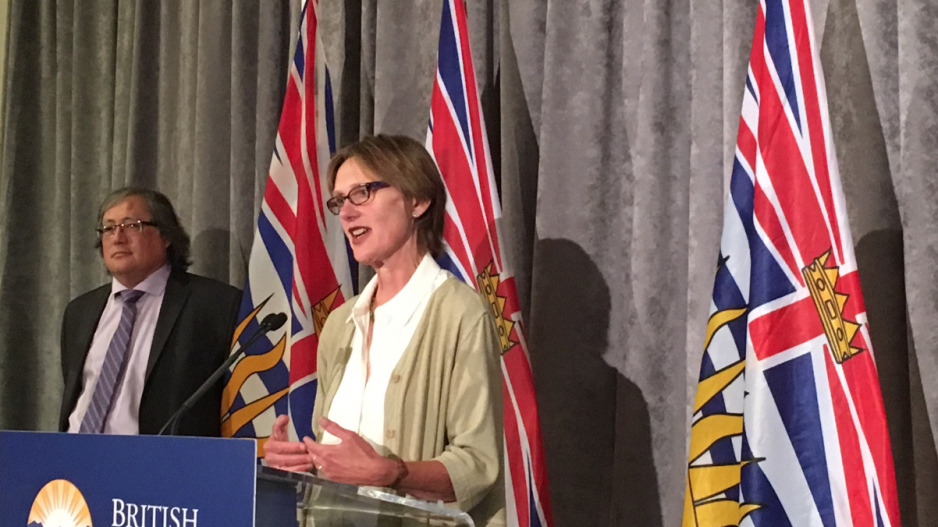The B.C government says it’s working to get 500 more taxis added to the roads throughout the province, a key recommendation from a long-awaited report on the taxi industry.
When ride-hailing services will be allowed to hit those same roads, however, still remains unclear.
Transportation Minister Claire Trevena repeated at a July 19 press conference the government’s promise to introduce ride-hailing legislation by the fall, but she wouldn’t offer an exact timetable as to when British Columbians should expect to use these services.
“They [Insurance Corporation of British Columbia] need the legislation changes, so once ICBC has done that, the doors will be open to ride-hailing companies to come to B.C.,” she said.
“A company could apply right now through our existing model but we want to make sure there are new [insurance] products available, and that will take ICBC some time to develop that.”
When pressed by a reporter why it seems B.C. seems to be behind other jurisdictions, Trevena replied: “I wouldn’t say we’re far behind the times at all.”
While the minister wouldn't commit to a timeline in front of reporters, a government news release stated that ride-sharing would be available to British Columbians by the fall of 2019.
Iain Black, CEO of the Greater Vancouver Board of Trade, said he was pleased with some of the recommendations from the report but sees little evidence the province is interested in expediting the introduction of ride-hailing services.
“There’s no requirement to reinvent the wheel here. We are the last major metropolis in North America to embrace this technology,” he said.
“We’ve got a delay here of a year [from the BC NDP’s original campaign promise]. That is one more Christmas season, that is one more grad season.”
Meanwhile, Black said putting more taxis on the road will only solve part of the problem.
“This is not going to overcome the issue of the woman in the wheelchair waiting three hours in the rain after the fireworks on Canada Day. This is not going to address the issue of people trying to get home from a downtown club to Cloverdale or Port Coquitlam safely,” he said.
“We want a healthy, vibrant, safe taxi industry here. But what we do not want is the status quo.”
B.C. Restaurant & Food Services Association CEO Ian Tostenson said he and fellow members of the Ridesharing Now for B.C. initiative were still digesting the announcement but their initial response was that it seemed to be a positive first step.
“We are very, very happy with what we heard from the minister today,” he said, speaking on behalf of Ridesharing Now for B.C.
But Tostenson acknowledged the government may not be moving as fast as the public would like and that Victoria may be acting “overcautious” because of politics.
Later in the day, Ridesharing Now for B.C. tweeted that it was "disappointed" with the government's announcement.
"BC deserve the same services that are available across Canada reducing impaired driving and increasing access to affordable, reliable service and they deserve it this year," the organization said via Twitter.
Surrey Board of Trade CEO Anita Huberman said Surrey residents have been “starved for transportation investment” and the city has been looking at ways to add innovative transportation options.
“All I can say about this morning’s announcement is: finally,” she said.
“We’re really looking forward to having ride-hailing in place — I hope — this year.”
The report authored by industry consultant Dan Hara, Modernizing Taxi Regulation, recommended boosting taxi fleets throughout the province by up to 15%.
This 15% increase would translate into about 300 more cabs in the Lower Mainland and about 200 more cabs in the rest of the province for a total of 500 additional vehicles, according to Trevena.
She added the province’s Passenger Transportation Board would work to implement this recommendation quickly.
And in a bid to manage supply, Hara’s report also recommended replacing fixed limits on cabs with a system where new taxis pay an additional fee for every trip.
The fee could not be passed onto riders through an additional fare-hike and would be implemented to ensure new taxis were entering the market to meet demand and avoid oversupply.
The report also suggested the province allow for more price flexibility for the taxi industry — a hallmark of the surge-pricing model used by ride-hailing services Lyft and Uber Technologies Inc.
Trevena said her government accepted the recommendation and would give the taxi industry the chance to discount fares when trips are bought through an app.
While the taxi industry has been pushing for the adoption of a universal app specifically for taxis, the report called the monopoly aspects of the proposal “risky and unnecessary.”
Trevena also committed to equipping the Passenger Transportation Board with better data about taxis.
This, the transportation minister said, would allow it to make better decisions about the number of vehicles needed, where they are needed and when they should operate.
Hara’s report, which was dated June 8, also recommended eliminating overlapping authority over the industry and creating a provincial regulator with responsibility for managing supply.
Provincial chauffeur permits should also be created to supplement municipal regimes, according to the report, and help communities outside the Lower Mainland close the gap when it comes to criminal record checks for taxi drivers.
Updated with comments from Iain Black and an additional comment from Ridesharing Now for B.C.




